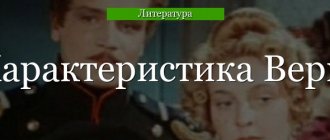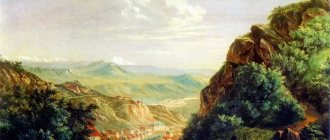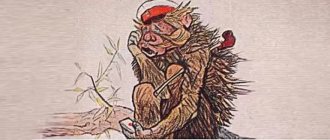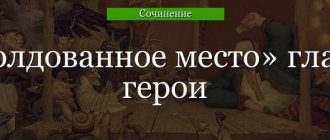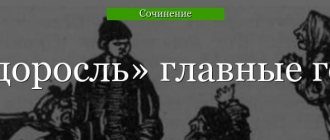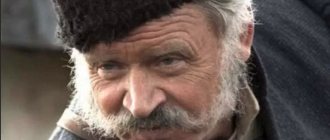“A Hero of Our Time” is a socio-psychological novel, one of the outstanding works of M. Yu. Lermontov, which depicts the deep internal conflict of the main character both with himself and with the world around him. In his work, the author continued the theme of the “superfluous person” who failed to reveal his potential and find himself in this life. In the novel “A Hero of Our Time,” the hero is most fully revealed through the characterization of minor characters with whom he enters into complex, sometimes very dramatic relationships.
All characters
- Evgeny Aleksandrovich Arbenin
- the main character of the work - Nina (Nastasya) Pavlovna
- Arbenin’s young wife - Prince Zvezdich
is a friend of Arbenin, an inveterate gambler, but not nearly as successful as Evgeniy. - Baroness Shtral
(mask) - a widow secretly in love with Zvezdich - Afanasy Pavlovich Kazarin
is another friend of Arbenin, also an inveterate gambler and sharper - Adam Petrovich Shprikh
is “the right person”, moving among the players and offering money on loan to those of them who lose big. - Official
- players
- hostess of the ball
- guests
- servants and maids
Characteristics and image of Pechorin with quotes
- ". He was generally very handsome and had one of those original faces that are especially popular with secular women. "
***
". He was of average height; His slender, thin figure and broad shoulders proved his strong build. "
***
". his mustache and eyebrows were black. "". slightly upturned nose, dazzling white teeth. "
***
". I was then standing in a fortress beyond the Terek with a company - this one is almost five years old. Once, in the fall, a transport with provisions arrived; There was an officer in the transport, a young man of about twenty-five. "
***
". It’s true, she met you in St. Petersburg, somewhere in the world. It seems that your story made a lot of noise there. The princess began to talk about your adventures. "
***
Before his trip to the Caucasus, Pechorin served in the guard in St. Petersburg. His superiors transfer him to the Caucasus for a duel (this “punishment” was common practice for such violations of discipline):
***
- “It seems that your story has caused a lot of noise there” (we are talking about a duel in St. Petersburg)
***
". I'm listening, your honor. "("Your Honor" is an appeal to the military of the IX-XIV class of the Table of Ranks)
***
". I could hardly assure her that you were so well brought up and knew the world so well that you could not have the intention of insulting her. "
***
". you are so shy of everyone that it is unlike anything else. "(Princess Ligovskaya about Pechorin)
***
". I began to madly enjoy all the pleasures that money can get, and of course, the pleasures did not make me sick of it. "
***
- ". I fell in love with society beauties and was loved - but their love only irritated my imagination and pride, and my heart remained empty. "
***
". Onam did not glance at her, filled with love and gratitude. I'm used to these looks; but once they were my bliss. "
***
". I hoped that boredom did not live under Chechen bullets; - in vain: after a month I became so accustomed to their buzzing and to the proximity of death that I became more bored than before. "
***
". Look, here we are two smart people; We know in advance that everything can be argued about endlessly, and therefore we do not argue. "
***
". His master, lighting a cigar, yawned twice and sat down on a bench on the other side of the gate. "
***
- ". After all, there are, really, these people who have it written in their nature that various extraordinary things should happen to them. "". You are a strange person. "
***
". Why she loves me so much, I really don’t know! Is evil really that attractive? "(Pechorin about himself)
***
***
". Grigory Alexandrovich, despite the heat and fatigue, did not want to return without booty, that was the kind of man he was: whatever he had in mind, give it to him; Apparently, as a child he was spoiled by his mother. "
***
". What do you want me to do? There are people with whom you must definitely agree. "(about Pechorin)
***
". Besides this, I also have a conviction - namely, that one disgusting evening I had the misfortune of being born. "
***
- ". that although I am ready to expose myself to death at any time, I am not in the least inclined to ruin my future in this world forever. "
***
". What should I do? I have a premonition When meeting a woman, I always unmistakably guessed whether she would love me or not. "
***
". Whenever you decide to speak ill of me, you better take a knife and stab me. "(Princess Mary about Pechorin's causticity)
***
". You are a dangerous person! - said Onam Ne, - I would rather get caught in the forest under a killer’s knife than get caught on your tongue. "
***
". For a long time now I have been living not with my heart, but with my head. I weigh and examine my own passions and actions with strict curiosity, but without participation. "
***
". you have the most prosaic tastes and I see that you love gastronomic music"
***
". I laugh at everything in the world, especially at feelings: it starts to scare her. "
***
". Grushnitsky hasn’t bowed to me for some time now, but now he looked at me quite impudently twice. He will remember all this when we have to pay. "
***
". My love did not bring happiness to anyone, because I did not sacrifice anything for those I loved: I loved for myself, for my own pleasure. "
***
". I never reveal my secrets myself, but I really love them to be guessed, because in this way I can always deny them on occasion. "
***
". I like to doubt everything: this disposition of mind does not interfere with the decisiveness of my character. "
***
". She was far from beautiful, but I also have my own prejudices about beauty. "
***
". I understood him, and he doesn’t love me for this, although outwardly we are on the most friendly terms. "
***
". We soon understood each other and became friends, because I am incapable of friendship. "
***
". I love enemies, although not in a Christian way. They amuse me, they stir my blood. "
***
". I know you are experienced in these things, you know women better than me. "(Grushnitsky about Pechorin)
***
". You, for example, are a different matter! - you, the winners of St. Petersburg: just look, how women are melting. "
***
". Grigory Aleksandrovich, as I think I said, passionately loved hunting: it used to be that he was driven into the forest to chase wild boars or goats. "
***
". I sat on horseback and galloped off into the steppe; I love riding a hot horse through the tall grass. "
***
". One day, bored with Boston and throwing the cards under the table, we sat at Major S’s for a very long time. "
Arbenin
Evgeny Aleksandrovich Arbenin is a middle-aged man who made his fortune playing cards.
He married not for prudent reasons, but only out of a desire to find a family, to be under the care of his wife. Simply because it was the right thing to do. In the hope of atonement for his main vice, Evgeniy swears not to participate in gambling. In his youth, Arbenin lived to the fullest, had fun in all available ways, and committed adultery with many women, including other people’s wives. Having such a wealth of experience, he became pathologically jealous and demanding. Not only to his chosen ones, but also to all people close to him in general. Eugene carefully selected his wife, whom he became attached to and fell in love with, to her misfortune. Quotes from Arbenin
Minor characters
Maxim Maksimych | Maxim Maksimych is a staff captain, an elderly man who spent most of his life in the Caucasus. Kind, merciful, friendly, a little naive. The nomadic life did not allow him to start a family, and he remained an old bachelor. Maxim Maksimych becomes attached to Bela with all his heart, whom he treats like a daughter. Pechorin’s coldness and neglect after separation are hard to cope with. Detailed description of Maxim Maksimych. |
Bela | Bela is a young Circassian beauty, the daughter of a rich and influential prince. A beautiful, bright, proud and unapproachable girl, “child of the mountains.” She becomes a toy in the hands of a bored Pechorin, who decides to make her his concubine. Over time, he falls in love with his captor, loves him tenderly and passionately, but quickly tires of the sophisticated officer. As a result, Bela dies at the hands of the robber Kazbich. Detailed characteristics of Bela. |
Princess Mary | Princess Mary (Maria Ligovskaya) is a representative of the capital's high society, a rich and beautiful bride. Being a well-educated, intelligent girl, she attracts Pechorin's attention. However, her lack of life experience makes her easy prey for a skilled manipulator. Acquaintance with Pechorin turns into a deep personal drama for the young princess. Detailed characteristics of Mary. |
Grushnitsky | Grushnitsky is a cadet, a poor nobleman, and a friend of Pechorin. A narcissistic, narrow-minded, selfish young man who values ostentatious tinsel above all else. Likes to be the center of attention, especially female attention. He dreams of officer epaulets, with the help of which he plans to break girls' hearts. As a result of a serious conflict, he ends up in a duel with Pechorin, where he meets his death. Detailed characteristics of Grushnitsky. |
Faith | Vera is a young beautiful noblewoman with whom Pechorin was once in love. Vera has a son from her first marriage, and, wanting to provide him with a decent future, she marries an old and sick, but very rich aristocrat. Her great love for Pechorin forces her to deceive her husbands. She sees all his shortcomings, but accepts him for who he really is. Vera is forced to leave Pechorin forever when her husband becomes aware of their relationship. Detailed characteristics of Vera. |
Nina, Arbenin's wife
Nina Pavlovna is a young, receptive and somewhat naive person.
It is not easy for her to understand the highly experienced Arbenin, his demands and rushing nature. A sharp change in her husband’s moods and his sudden tendency towards isolation, gloominess, and depression forces Nina to think that Evgeny no longer loves her. He is irritated by her habit of kissing his forehead, and is overly jealous of his wife towards everyone. The girl becomes depressed and upset. In Lermontov's play, a considerable part is devoted to Nina's suffering. She wants a holiday and fun, a “masquerade,” but Arbenin is categorically against it. The conflict of interests and the inconsistency of the desires of the two heroes ultimately lead to an absolutely unpredictable ending and irreparable consequences.
In act 3 (scene 1, exit 3) Nina's full name is mentioned - Nastasya Pavlovna.
Summary of the chapter “Bela”
A traveler from Tiflis who reached the Koishaur Valley. I was delighted with the picturesque area - mountains, steep cliffs, majestic plane trees.
He stops near a crowd of noisy Georgians and mountaineers. Here he meets Russian officer Maxim Maksimych, who has been serving in the Caucasus for quite some time.
Therefore, he knows well all the customs and morals of the local residents. Due to bad weather, fellow travelers are forced to spend the night with the mountaineers. Maxim Maksimych talks about his exploits.
One day, Staff Captain Pechorin arrived at the fortress - a rich and educated man, but with an overly independent disposition.
And not far from the fortress lived a prince raising a teenager - a brave and desperate young man, a lover of money.
Pechorin and Maxim Maksimych sometimes teased the guy. And he immediately grabbed the dagger.
Shprikh
Adam Petrovich Shprikh is a dark person of unknown nationality who moves among the players and offers to lend money to those of them who lose big. Comes from a family of Russian Germans. Many faces, which Arbenin perceives as hypocrisy and duplicity. Lermontov gives a description of his appearance that includes “glass bead eyes” and an “evil smile.” Kazarin presents Shprikh as a talented person, sociable and sociable, active, friendly. But the main character treats such qualities with great suspicion and more than once enters into controversial discussions with Shprikh.
How old is Pechorin
More details about how the evolution of a kind boy into an immoral social unit took place are shown in the table with a quote from Pechorin himself:
The young man speaks French skillfully, dances, knows how to behave in society, but he hasn’t read many books, and he soon gets tired of the world.
***
In his youth, the hero went to great lengths: he spent a lot of money on entertainment and pleasure, but this also disappointed him.
The image was created by M. Yu. Lermontov to show the loss of moral guidelines of the generation of the 30s of the nineteenth century.
Kazbich's horse, which was the closest thing to him. When Azamat stole it, Kazbich cried like a child. It was one of the smartest and dashing horses in the area.
***
An episodic character in the chapter "Bela", the father of Azamat and Bela. He was killed by Kazbich, because he thought that Azamat had stolen his horse with his father’s permission.
***
An episodic character in the chapter “Taman”, an old and almost deaf woman, the mistress of the house where Pechorin stayed. She lives with a blind orphan boy.
In the novel by M. Yu. Lermontov “A Hero of Our Time” there are many heroes whose fates in one way or another echo the life of the main character Grigory Pechorin.
Despite the light color of his hair, his mustache and eyebrows were black - a sign of the breed in a person, just like the black mane and black tail of a white horse
The man is charming, attracts people and women like him, despite the fact that he is not very attractive in appearance:
He paid some kind of compliment to the princess: she, apparently, is not very picky, for since then she has responded to his bow with the sweetest smile
Meeting with Bela
One day the prince invited officers to the wedding of his eldest daughter. When the celebration was underway, Pechorin’s youngest daughter suddenly approached and made him a pleasant compliment, which did not escape Pechorin.
The girl was beautiful that the officer could not take his eyes off her all evening.
But he was not the only one who admired the beauty of the girl, but also Kazbich, a highlander who wanted to get Bela at all costs.
And since Bela’s brother Azamat was greedy for money, he almost without hesitation agreed to exchange his sister for a horse.
But Kazbich did not want to give up his best horse, even in exchange for a girl.
Then he and Azamat quarreled and almost organized a mass carving during the wedding evening.
Pechorin thought about this incident and teased Azamat every now and then. He even promised him this princely horse in exchange for Bela.
Maxim Maksimych was against such a vile deed, but Pechorin assured him that the Circassian girl would be happy with a husband like him.
Princess Mary
(333 words) Princess Mary can be called the most important female character in the novel “A Hero of Our Time.” It is her image that the author reveals in detail and vividly on the pages of his work. It is collective and demonstrates the main features of all the secular young ladies who were so tired of Pechorin.
Princess Mary appears in the chapter of the same name. She is the daughter of Princess Ligovskaya, a modest, educated, but extremely typical noblewoman, imbued with the spirit of the water society. Mary and her mother came to Pyatigorsk on water from Moscow. The girl’s light gait, sophisticated appearance, long eyelashes and dark hair could not help but attract the attention of young officers. The princess's mother dreamed of finding a good match for her daughter, but the young lady was not interested in this. Mary's main hobbies were French romance novels, piano and singing: she had an amazing voice.
The heroine knew her worth, sometimes she looked down on people, some had the opinion of her that she was arrogant, but Mary could afford it - she was smart, rich and pretty. Pechorin especially, who seemed to be stroking his interlocutor. The heroine had a sharp tongue, but without the mask of secularism she remained a romantic, naive and dreamy young lady. Therefore, she accepted Grushnitsky’s courtship; in him she wanted to see the hero of one of her novels. But when a more mysterious and interesting interlocutor appeared, she easily moved away from the cadet. However, the girl did not have insight and sufficient life experience to unravel Gregory’s subtle game. Pechorin began to court the princess out of boredom and the opportunity to hide his relationship with Vera. Mary hoped for a sincere feeling, for a quick marriage. Having learned that Gregory did not love her, she was sincerely upset and angry. Light society has not yet taken away her ability to experience and feel. The princess had a nervous breakdown and developed mental illness. She became Pechorin's next victim.
The image of Princess Mary is very important; it shows how easy it is to lose yourself in your romantic dreams and be deceived by them. Also, the author, with the help of Mary, raises the problem of the truth and falsity of love. The heroine fell in love not with Gregory, but with the one he played for her, seeing the weaknesses and preferences of the “victim”. And, of course, the image of the princess helps the reader to better get to know the hero of his time.
